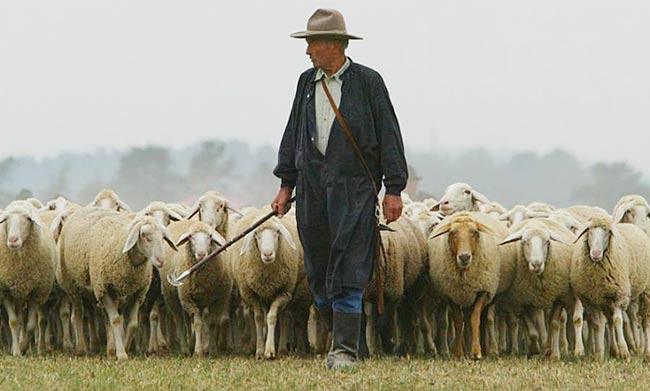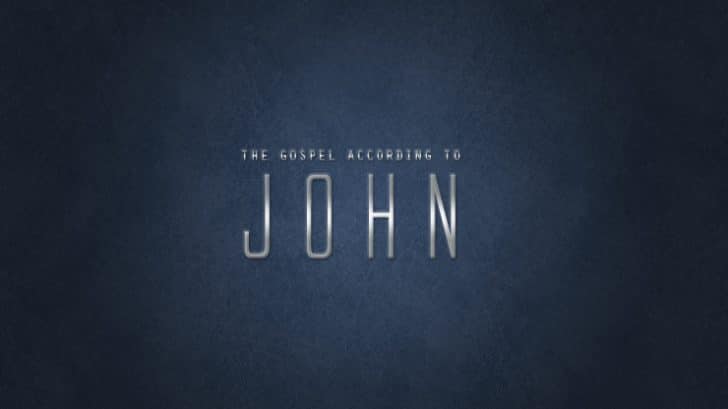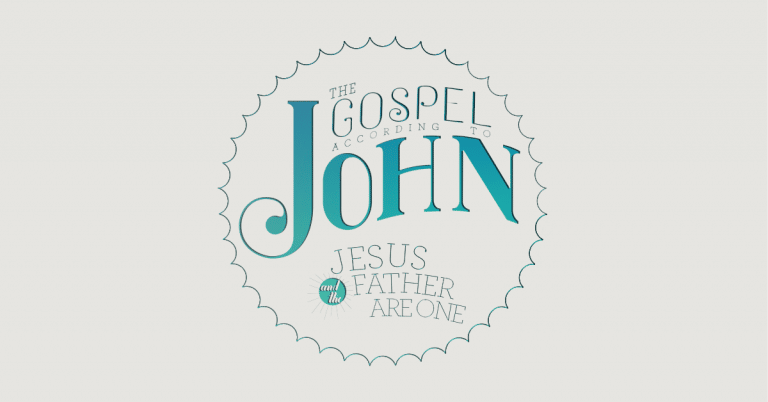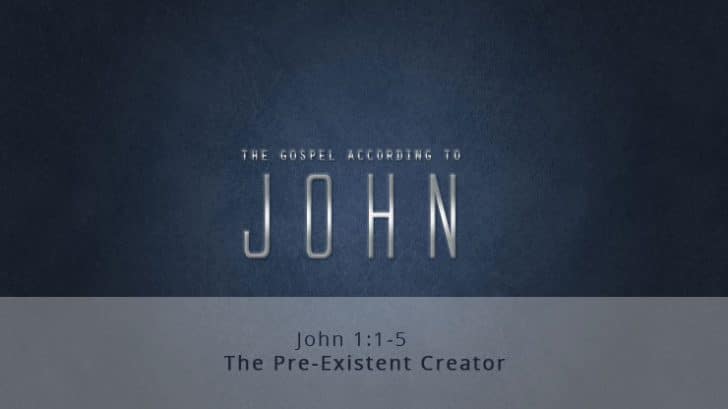John 10: 1-21 | Knowing the Shepherd’s Voice
“Truly, truly, I say to you, he who does not enter the sheepfold by the door but climbs in by another way, that man is a thief and a robber. But he who enters by the door is the shepherd of the sheep. To him the gatekeeper opens. The sheep hear his voice, and he calls his own sheep by name and leads them out. When he has brought out all his own, he goes before them, and the sheep follow him, for they know his voice. A stranger they will not follow, but they will flee from him, for they do not know the voice of strangers.” (John 10:1-5)
When I was between 7th and 8th grades I spent the summer working on a couple of ranches. My mom had to attend summer classes at the U to renew her teaching certificate and so my sister and I stayed with some people that had farms and helped them.
One of my jobs was to herd some sheep out of an alfalfa field back into the pen where they belonged. Being a city boy, I really had no idea of what I was doing. I did know then that herding sheep is not as easy as it sounds. It didn’t matter the method I tried the sheep did not want to go where I wanted them to go. They were all for staying in the alfalfa where they had plenty to eat and little or no dangers as far as they knew. These sheep did not recognize my voice and I probably seemed to them as a danger. They just knew my will was “not in their best interest” so they did everything they could to oppose me.
Back in Jesus’ day shepherds would bring their sheep into pens in the evening for protection. They would have flocks from several different shepherds in one large corral. In the morning the shepherd would come and call to his sheep and the ones that recognized his voice would follow him out of the corral and into the surrounding fields to eat. Each shepherd had a different voice or mechanism to call the sheep and his flock would follow that sound. They knew from experience that this was a sound they could trust and that it meant good things are ahead. All the other sheep in the corral would just ignore the sound because it meant nothing to them. They did not recognize the voice of another shepherd. They only followed their own shepherd.
This figure of speech Jesus used with them, but they did not understand what he was saying to them. So Jesus again said to them, “Truly, truly, I say to you, I am the door of the sheep. All who came before me are thieves and robbers, but the sheep did not listen to them. I am the door. If anyone enters by me, he will be saved and will go in and out and find pasture. The thief comes only to steal and kill and destroy. I came that they may have life and have it abundantly. (John 10:6-10)
Jesus seems to switch His metaphor on this one. First He is the Shepherd, now He is the gate. This is all part of the same conversation. It is easy to separate these but we need to remember we are still with the same group that criticized Jesus for healing the blind man on the Sabbath.
Here Jesus is cautioning about listening to anyone that does not come through Him. These voices can be from anywhere. Often times we think of evil people as the ones Jesus is referring to. That is not exactly what He says. He is talking about the ones that may have seemed right. May have had a connection to God but were saying things “for God” but were not God.
Sometimes those voices seem so Godly, or so wise, or so correct. It is hard to tell the difference. Even the voices that have good intentions can be ones that lead us away from God’s will for our lives. Just like the sheep I was trying to get out of the alfalfa field. My intentions were good but they had no reason to trust me. I was not the voice they recognized. I had not fed them. I had not protected them from harm. I was just a stranger trying to force them away from what they thought was a sweet situation.
I am the good shepherd. The good shepherd lays down his life for the sheep. He who is a hired hand and not a shepherd, who does not own the sheep, sees the wolf coming and leaves the sheep and flees, and the wolf snatches them and scatters them. He flees because he is a hired hand and cares nothing for the sheep. I am the good shepherd. I know my own and my own know me, just as the Father knows me and I know the Father; and I lay down my life for the sheep. (John 10:11-15)
Here Jesus is back to being the shepherd. He is doing what Jesus does best. Drawing in His sheep. Showing His compassion and concern for His flock.
He is warning against following the “hired hands”.
Right now the church is full of “hired hands”. The ones that tell us what we want to hear just so we will flock to their buildings and add to their “ministries”. They seek prestige, fortune and want to make a name for themselves. A lot like in the days of Jesus.
The more followers a Pharisee had, the more prestige in the temple he had.
A lamb when it is first born will go to anyone that will feed it. It just a short time it recognizes his mother and will only follow her. As time progresses, it explores more and more, going farther and farther from its mother. Before long it will transfer it’s instinct to follow the crowd. When danger presents itself, sheep will bunch together for protection.
That is why when I was trying to get the sheep through the gate to the corral they would all bunch together and run the opposite way. I would try to separate a few to get them through the gate so the others might follow. Again, they had no reason to trust me.
As parent, our job is to recognize that our children will eventually leave the fold and begin to follow other voices.
We want those “other voices” to be ones that come in by the gate. The ones that are willing to lay down their lives for the sheep. The ones that are following the shepherd.
And I have other sheep that are not of this fold. I must bring them also, and they will listen to my voice. So there will be one flock, one shepherd.
For this reason the Father loves me, because I lay down my life that I may take it up again. No one takes it from me, but I lay it down of my own accord. I have authority to lay it down, and I have authority to take it up again. This charge I have received from my Father.” (Joh 10:16-18)
Sometimes we just want to be special. Not in a good way. We want to be better than the next guy. Jesus is letting them know they are not the only ones that have access to the shelter and protection of being His sheep.
We are not in charge. He is the shepherd. We need to follow him. We don’t pick the other sheep. We don’t get to choose who comes in the gate. We don’t get to choose when to go out or when to come in.
Had we just left those sheep in the field, there would have been no food for the winter for them. The sheep would have died with no chance for survival. They did not know why I was trying to corral them. They did not care.
The shepherd cares for us. He is willing to lay down His life for us. We need to follow him where He leads. King David understood this is a very real way. Even though he made horrible choices, he understood and recognized God’s voice.
For he is our God, and we are the people of his pasture, and the sheep of his hand. (Psalm 95:7)
The LORD is my shepherd; I shall not want. He makes me lie down in green pastures. He leads me beside still waters. He restores my soul. He leads me in paths of righteousness for his name’s sake. Even though I walk through the valley of the shadow of death, I will fear no evil, for you are with me; your rod and your staff, they comfort me. You prepare a table before me in the presence of my enemies; you anoint my head with oil; my cup overflows. Surely goodness and mercy shall follow me all the days of my life, and I shall dwell in the house of the LORD forever. (Psalm 23 )
I believe this is how we come to the place where we are sitting down, eating dinner in the presence of our enemies. We have to come to the place where we are following Jesus no matter where He leads. Remember to sit down and eat in the presence of our enemies, we first have to be lead into their presence. That is usually the point where I turn to God and ask “Is this really you, God?” I don’t hang around to hear His answer. Then there’s that whole “valley of the shadow of death” thing.
There was again a division among the Jews because of these words. Many of them said, “He has a demon, and is insane; why listen to him?” Others said, “These are not the words of one who is oppressed by a demon. Can a demon open the eyes of the blind?” (John 10:19-21)
Learning to hear the Shepherd’s voice is probably the most important thing one could learn next to salvation. Even with salvation, you cannot come to Jesus without hearing His voice saying “Come, follow me”.
Trusting that voice, knowing that voice does not happen overnight. It takes a building of relationship, an understanding of who the voice belongs to.
Just as a lamb comes to know the voice of the shepherd, we need to come to know the voice of the Savior. It’s hard to hear the Shepherd’s voice sometimes. Sometimes it is a still small voice in the midst of all the other voices screaming at us. Even the ones that would seem to be “right”.
for everyone who lives on milk is unskilled in the word of righteousness, since he is a child. But solid food is for the mature, for those who have their powers of discernment trained by constant practice to distinguish good from evil. (Hebrews 5:13-14)
Are you listening? Can you distinguish the Shepherd’s voice? How do we know?
Sermon by: Roger Faircloth




